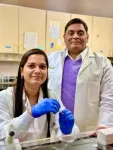(Press-News.org) Authors say the findings underscore the urgent need for preventive measures for people with MS who are inadequately protected by COVID-19 vaccination alone.
*Please mention the European Congress of Clinical Microbiology and Infectious Diseases (ECCMID 2024, Barcelona, 27-30 April) if using this material*
New real-world research being presented at this year’s European Congress of Clinical Microbiology and Infectious Diseases (ECCMID 2024) in Barcelona, Spain (27-30 April) reveals that people living with multiple sclerosis (MS) face a much higher risk of being hospitalised and dying from COVID-19 than the general population. The risk persists in individuals who received 3 or more vaccine doses.
These findings indicate that vaccination alone may not adequately protect individuals with MS from severe COVID-19 outcomes, and underscore the urgent need for additional preventive measures against COVID-19 in this vulnerable population, say researchers.
Lead author Professor Jennifer Quint from Imperial College London, UK explains, “Having multiple sclerosis in itself doesn’t increase the risk of getting COVID-19, rather it’s the taking of immune modifying medicine such as B-cell depletion therapies that can reduce the effectiveness of vaccines by preventing the immune system from mounting a robust protective response. Some MS-specific factors, such as having underlying conditions or higher levels of disability can contribute to poor outcomes. As a result, even after repeated doses of COVID-19 vaccines, some individuals with MS remain at high risk of serious outcomes from COVID-19.”
The new analyses are part of the INFORM (INvestigation oF cOvid-19 Risk among iMmunocompromised populations) study, which analysed data of nearly 12 million people aged 12 years and older in England to assess COVID-19’s impact, risk, and healthcare resource use (HCRU) among immunocompromised populations compared with the general population during the Omicron wave.
Previous results from INFORM found that immunocompromised individuals face disproportionate burdens from COVID-19, with substantially higher risk of developing severe COVID-19 outcomes than the general population [1]. However, the specific burden faced by individuals with MS, which was not categorised as immunocompromised, was not assessed previously.
To find out more, researchers compared the risk of COVID-19 hospitalisation and death in vaccinated individuals with MS and the general population in England from 1st January to 31st December, 2022.
They analysed routinely collected, national primary and secondary care electronic data from a random sample of 25% of all individuals aged 12 years or older in England registered with the National Health Service (NHS). Subgroup analysis was conducted among individuals who had been vaccinated with three or more doses of COVID-19 vaccines by Jan 1st, 2022.
Of 11,990,730 individuals included in the study, 16,350 (0.1%) individuals with MS were identified. Over half (6,060,635) of those in the general population and more than three-quarters (12,905) of patients with MS had been fully vaccinated (received at least three doses of a COVID-19 vaccine by Jan 1st, 2022).
During the study, a total of 20,910 COVID-19 hospitalisations and 4,810 COVID-19 deaths were recorded in the general population, corresponding to crude overall incidence rates of 0.24 and 0.06 per 100 person-years, respectively.
Among individuals with MS, there were 215 COVID-19 hospitalisations and 25 COVID-19 deaths, corresponding to substantially higher overall incidence rates of 1.28 and 0.14 per 100 person-years, respectively.
After adjusting for age and sex, having MS was associated with a seven times greater risk of COVID-19 hospitalisation and fourfold increased risk of dying from COVID-19 compared to the general population.
“We hope that these findings raise awareness that the threat of COVID-19 is still very real for many, and that vaccine boosters are inadequate to protect this clinically vulnerable group”, says Professor Quint. “With new variants constantly emerging, people living with MS should be considered an important high-risk group for COVID-19 hospitalisation and death for which additional preventive measures and multi-layered public health protections are urgently needed.”
Despite the important findings, the authors point to several limitations, including that they can’t rule out the possibility that other unmeasured factors such as underling illness and level of MS disability might have influenced the results. They also note that they did not examine the effect of use of disease modifying therapies, time since last vaccination, type of vaccination, and prior infection.
END
Individuals with multiple sclerosis face substantially greater risk of hospitalisation and death from COVID-19, despite high rates of vaccination
UK study in almost 12 million people during the Omicron wave finds that even after repeated doses of COVID-19 vaccines, individuals with multiple sclerosis had a seven times greater risk of hospitalisation and a four-fold increased risk of dying from CO
2024-03-28
ELSE PRESS RELEASES FROM THIS DATE:
Study shows obesity in childhood associated with a more than doubling of risk of developing multiple sclerosis in early adulthood
2024-03-28
New research to be presented at this year’s European Congress on Obesity in Venice, Italy (12-15 May) shows that having obesity in childhood is associated with a more than doubling of the risk of later developing multiple sclerosis. The study is by Professor Claude Marcus and Associate Professor Emilia Hagman, Karolinska Institutet, Stockholm, Sweden, and colleagues.
Emerging evidence implies a link between high BMI in adolescence and an increased risk of Multiple Sclerosis (MS). Yet, most studies evaluating this association are cross-sectional, have retrospective design with self-reported data, have used solely genetic correlations, or use paediatric ...
Rice Emerging Scholars Program receives $2.5M NSF grant to boost STEM education
2024-03-28
Rice University’s Emerging Scholars Program (RESP) has received a five-year, $2.5 million grant from the National Science Foundation. The funding aims to bolster achievements in science, technology, engineering and mathematics (STEM) among students from under-resourced families and communities.
The grant will enable RESP to expand its reach and impact, offering increased support to its scholars via summer tuition scholarships, housing subsidies and research stipends. The number of scholars in the program will increase from 40 to 50 in Summer 2024 and to 60 in Summer 2025.
“Rice ...
Virtual rehabilitation provides benefits for stroke recovery
2024-03-28
A stroke often impacts a person’s ability to move their lower body from the hips down to the feet.
This leads to diminished quality of life and mental health in addition to increased susceptibility to falls. But now, UBC Okanagan researchers are exploring new treatment methods to help bridge the service delivery gap, and recovery outcomes, for patients after a stroke.
“Shortened length of inpatient stays and continued challenges in transitioning back to the community—including poor access to continued stroke rehabilitation services—have resulted in substantial unmet recovery needs,” ...
Generative AI develops potential new drugs for antibiotic-resistant bacteria
2024-03-28
With nearly 5 million deaths linked to antibiotic resistance globally every year, new ways to combat resistant bacterial strains are urgently needed.
Researchers at Stanford Medicine and McMaster University are tackling this problem with generative artificial intelligence. A new model, dubbed SyntheMol (for synthesizing molecules), created structures and chemical recipes for six novel drugs aimed at killing resistant strains of Acinetobacter baumannii, one of the leading pathogens responsible for antibacterial resistance-related deaths.
The researchers described their model and experimental validation of these new compounds in a study published March 22 in the journal ...
Biofuels could help island nations survive a global catastrophe, study suggests
2024-03-28
A major global catastrophe could disrupt trade in liquid fuels used to sustain industrial agriculture, impacting the food supply of island nations like New Zealand that depend on oil imports.
A new study in the journal Risk Analysis suggests that New Zealand and other island nations dependent on imported fuel can plan for future emergencies by stepping up their production of biofuel from locally grown crops (like canola) and farming more fuel-efficient crops (like wheat and potatoes rather than dairy).
In the event of a major disruption in liquid fuel imports, results showed that New ...
NJIT research team discovering how fluids behave in nanopores with NSF grant
2024-03-28
A research team from New Jersey Institute of Technology is uncovering mysteries surrounding fluids in nanoporous materials, and has been recently awarded a grant from the National Science Foundation (NSF) to support this research.
The research is focused on the elasticity, or compressibility, of fluids in these nanopores. Understanding the elastic properties of fluids has significant implications across multiple disciplines. Engineering applications, geological exploration, materials science and environmental studies ...
New study shows association of historical housing discrimination and shortfalls in colon cancer treatment
2024-03-28
BIRMINGHAM, Ala. – A nationwide study of 196 cities shows that housing discrimination from 90 years ago still casts a historical shadow of inequities in colon cancer care today, S.M. Qasim Hussaini, M.D., of the University of Alabama at Birmingham and colleagues at the American Cancer Society and Johns Hopkins School of Public Health report in the journal JCO Oncology Practice.
In the 1930s, the federally sponsored Home Owners’ Loan Corporation, or HOLC, used racial composition to map out residential areas worthy of receiving mortgage loans and those areas to avoid. Neighborhoods ...
Social media use may help to empower plastic surgery patients
2024-03-28
Waltham — March 28, 2024 — For patients considering or undergoing plastic and reconstructive surgery (PRS) procedures, using social media to gather information and answer questions can enhance patient empowerment – potentially leading to increased autonomy and better decision-making, reports a study in the April issue of Plastic and Reconstructive Surgery®, the official medical journal of the American Society of Plastic Surgeons (ASPS). The journal is published in the Lippincott portfolio by Wolters Kluwer.
"Our study suggests that connecting to social media is associated with meaningful increases in empowerment for PRS patients, ...
Q&A: How to train AI when you don't have enough data
2024-03-28
Artificial intelligence excels at sorting through information and detecting patterns or trends. But these machine learning algorithms need to be trained with large amounts of data first.
As researchers explore potential applications for AI, they have found scenarios where AI could be really useful — such as analyzing X-ray image data to look for evidence of rare conditions or detecting a rare fish species caught on a commercial fishing boat — but there's not enough data to accurately train the algorithms.
Jenq-Neng Hwang, University of Washington professor of electrical and computer and engineering, specializes in these issues. ...
Wayne State University researchers uncover potential treatment targets for Zika virus-related eye abnormalities
2024-03-28
DETROIT - A groundbreaking study published in the journal iScience presents crucial insights into the ocular effects of Zika virus infection during pregnancy and offers promising avenues for therapeutic intervention.
Produced by a team of researchers in the Department of Ophthalmology, Visual and Anatomical Sciences at the Wayne State University School of Medicine, the paper, “Targeting ABCG1 and SREBP-2 mediated cholesterol homeostasis ameliorates Zika virus-induced ocular pathology,” provides compelling evidence of the ...
LAST 30 PRESS RELEASES:
Gut microbiome connected with heart disease precursor
Nitrous oxide, a product of fertilizer use, may harm some soil bacteria
FAU lands $4.5M US Air Force T-1A Jayhawk flight simulator
SimTac: A physics-based simulator for vision-based tactile sensing with biomorphic structures
Preparing students to deal with ‘reality shock’ in the workplace
Researchers develop beating, 3D-printed heart model for surgical practice
Black soldier fly larvae show promise for safe organic waste removal
People with COPD commonly misuse medications
How periodontitis-linked bacteria accelerate osteoporosis-like bone loss through the gut
Understanding how cells take up and use isolated ‘powerhouses’ to restore energy function
Ten-point plan to deliver climate education unveiled by experts
Team led by UC San Diego researchers selected for prestigious global cancer prize
Study: Reported crop yield gains from breeding may be overstated
Stem cells from human baby teeth show promise for treating cerebral palsy
Chimps’ love for crystals could help us understand our own ancestors’ fascination with these stones
Vaginal estrogen therapy not linked to cancer recurrence in survivors of endometrial cancer
How estrogen helps protect women from high blood pressure
Breaking the efficiency barrier: Researchers propose multi-stage solar system to harness the full spectrum
A new name, a new beginning: Building a green energy future together
From algorithms to atoms: How artificial intelligence is accelerating the discovery of next-generation energy materials
Loneliness linked to fear of embarrassment: teen research
New MOH–NUS Fellowship launched to strengthen everyday ethics in Singapore’s healthcare sector
Sungkyunkwan University researchers develop next-generation transparent electrode without rare metal indium
What's going on inside quantum computers?: New method simplifies process tomography
This ancient plant-eater had a twisted jaw and sideways-facing teeth
Jackdaw chicks listen to adults to learn about predators
Toxic algal bloom has taken a heavy toll on mental health
Beyond silicon: SKKU team presents Indium Selenide roadmap for ultra-low-power AI and quantum computing
Sugar comforts newborn babies during painful procedures
Pollen exposure linked to poorer exam results taken at the end of secondary school
[Press-News.org] Individuals with multiple sclerosis face substantially greater risk of hospitalisation and death from COVID-19, despite high rates of vaccinationUK study in almost 12 million people during the Omicron wave finds that even after repeated doses of COVID-19 vaccines, individuals with multiple sclerosis had a seven times greater risk of hospitalisation and a four-fold increased risk of dying from CO



